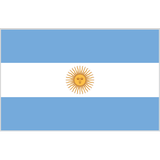
Argentine soccer equality fight makes English appreciative
LE HAVRE, France (AP) — It wasn't until the messages began flooding in from home that Argentina midfielder Ruth Bravo truly grasped the scale of the team's achievement at the Women's World Cup.
Argentina, outscored 33-2 in six previous World Cup losses, scored its first point in tournament history when it played to a landmark draw against Japan in its opener.
It was, Bravo said, a "point of gold" for a team that didn't even qualify for the previous two World Cups.
"We are making history for our country," Bravo said.
Next up is Friday's second Group D game against England, with Argentina aiming for so much more. The team has been forced to fight with its own federation to earn the conditions enjoyed by the popular and successful Argentina men's national team.
"This is really is the first step," Bravo said. "Argentina has a long way to go and a lot of work to do."
Even making the field was in doubt just two years ago when the players went on strike over unpaid stipends, a lack of uniforms and inadequate training conditions.
Intense lobbying forced the Argentine soccer association to recognize the need to professionalize the league, and in March it was announced that each of the 16 clubs of the women's top division must now have at least eight professional contracts with female players.
"They have so fought hard to be here to start," England defender Demi Stokes said in Le Havre ahead of the meeting with Argentina. "It was nice to see how excited they were they got their first point."
The 27-year-old Manchester City player has seen in England how teams can be transformed by increased funding and commitment from a governing body.
Argentine players have some way to go to match the level of backing players in England have increasingly benefited from since the creation of the Women's Super League in 2011. From last season, the English Football Association required all teams to be fully professional to compete in the topflight.
England coach Phil Neville doesn't let his players forget how much of a struggle it was for previous generations.
"We want to make sure we appreciate everything we're given," said Neville, whose team opened with a 2-1 victory against Scotland on Sunday. "We keep our feet on the ground and earn what we're given. Before every game we always make reference to the people who fought for us to get these conditions."
Women's soccer was banned in England for a half-century from 1921.
Neville, who won every major honor in the men's game with Manchester United, has been grasping the history since gaining his first job in women's soccer when he was appointed by England in January 2018.
"We feel blessed," Neville said. "We make sure we're fully aware of the history and sacrifices. We've got a few players — Jill Scott and Karen Carney spring to mind — who have seen the struggles. They were training without bibs, ball, pitches, coaches. Yes we want to be successful at this World Cup, but my players want to make sure the next generation has better than what we've got.
"When I came to this job, the FA told me they'd back me 100%. The FA have not just backed me, they've given me more than what I've wanted."
Neville wants players the world over to be enjoying support for women's soccer like in England, which helped the team finish third at the 2015 World Cup.
"Thailand and Argentina are at the start of their journeys, where we were 15 years ago," Neville said, also referencing the team routed 13-0 by the United States on Tuesday. "They'll get where they need to be. Now women's football is being promoted and accepted around the world, we're heading in the right direction."
